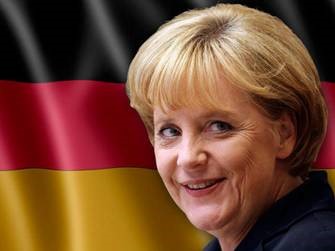
【The making of Angela Merkel】
——英国《金融时报》专栏作家 西蒙•库柏
A former teacher recalls little Angela Merkel trotting around her East German school in the blue shirt of the FDJ, the communist youth organisation. Later, Merkel served as cultural secretary for the FDJ while working as a physicist at the Academy of Sciences. She conformed to the status quo despite never believing in communism.
一位以前的老师回忆起年少的安格拉•默克尔(Angela Merkel)在东德的校园里四处奔跑着,穿着共青团组织德意志自由青年同盟(FDJ)的蓝色衬衫。后来,默克尔在FDJ担任宣传秘书,同时也是东德科学院的物理学家。即使从不信奉共产主义,她也安于当时的现状。
These seem strange beginnings for a German chancellor. Yet there is continuity. A consistent picture of Merkel emerges from five recent biographies: by Stefan Kornelius in German, Marion Van Renterghem in French, Matthew Qvortrup in English, Michèle de Waard in Dutch, plus a critical conservative German collection edited by Philip Plickert*. The woman almost certain to be re-elected on September 24 has a genius for locating the centre of any society she finds herself in. Henry Kissinger, a longtime confidant, once said she appears “the perfect expression of her time”. Merkel is an opportunist who often U-turns, yet she seems well suited to lead the west.
这些对于一位德国总理来说,是很离奇的开端。但仍存在着连续性。从近来的五本传记中可以看出默克尔一贯的形象,这五本传记的作者分别是:德国的斯特凡•科内柳斯(Stefan Kornelius)、法国的马利翁•范•伦特赫姆(Marion Van Renterghem)、英国的马修•奎特普(Matthew Qvortrup)、荷兰的米歇尔•迪•沃德(Michèle de Waard)、以及菲利普•普里克特(Philip Plickert)编辑的一部批判性的、保守的德文集。这位几乎无疑将在9月24日的大选中再度当选的女性有一种天赋,能够定位出她所在的任何一个组织的中心。其多年的好友亨利•基辛格(Henry Kissinger)曾说,默克尔似乎“是她那个时代的完美表现”。默克尔是一个机会主义者,态度经常出现180度的大转弯,但她似乎很适合领导西方。
Communist East Germany shaped her. In her first 35 years she learnt that ideology is mostly bunk; became a physicist because the field was scarcely infected by Marxism-Leninism; and dreamt of being free to fulfil herself. Only months after the Berlin Wall fell, she embraced her vocation: Chancellor Helmut Kohl put her in his cabinet as a token female East German.
共产主义东德塑造了她。她从生命中的前35年学到意识形态是靠不住的;后来成为了一名物理学家,因为这个领域几乎没有受到马克思列宁主义的影响;并梦想着自由地实现自我。就在柏林墙倒塌的几个月后,她欣然接受了自己的使命:赫尔穆特•科尔(Helmut Kohl)总理把她拉进自己的内阁,作为女性东德人的一个象征。
She found many male politicians vain, verbose and under-informed. They initially dismissed her as a boring beta-female, and underestimated her will to power. Kohl called her “clueless” and said she “never quite learnt to eat with a knife and fork”. In 1999 she knifed him in the back, then outwitted her rival Wolfgang Schäuble to become chancellor. She doesn’t bother with grudges: Schäuble became her trusted finance minister.
她发现许多男性政治家都自负、啰嗦还孤陋寡闻。他们起初认为她是个无聊的小女人,并低估了她的权力欲。科尔说她“一窍不通”并说她“从来没学会用刀叉吃饭”。1999年她给了科尔背后一击,然后以智取胜,战胜了她的对手沃尔夫冈•朔伊布勒(Wolfgang Schäuble)成为总理。她不计前嫌:朔伊布勒成为了她信任的财政部长。
Her chancellor’s office is 10 minutes’ walk from her former squat in East Berlin; she hasn’t strayed far from her origins. Confronted with a problem, she gathers expert evidence like a scientist. In 2007, about to go into an opera, she received a text from her financial counsellor: “IKB is in trouble.” Merkel replied (according to De Waard), “What’s IKB?” It was a German bank, which, after dabbling in US subprime assets, needed billions in bailouts.
她的总理办公室离她在东柏林的居所只有10分钟的路程;她并没有偏离自己的出身。遇到问题时,她会像一名科学家一样搜集专业证据。2007年,正要去歌剧院时,她收到了一则来自财政顾问的短信:“IKB遇到麻烦了。”默克尔重复着(据迪•沃德写道),“IKB是什么?”IKB是一家德国银行,在涉足美国的次贷资产后,需要数十亿财政援助。
When the euro crisis broke, Merkel knew little about finance. She only had her standard German reflexes: distrust of market “speculators”, trust in corporations. Teaching herself the subject, she discovered with dismay that economists — unlike physicists — routinely gave her wrong analyses. Still, she enjoyed impromptu seminars on the “fat tail” theory of markets. Complexity doesn’t scare her. After all, she reminds herself, as a physicist she mastered integral calculus.
当欧元危机爆发时,默克尔对金融所知甚少。她仅能做出标准的德国人的反应:不信任市场“投机者”,信任企业。她自学金融,沮丧地发现经济学家们——跟物理学家不一样——经常给她错误的分析。尽管如此,她还是喜欢那些关于市场“厚尾”理论的即兴研讨会。复杂吓不倒她。毕竟,她提醒自己,作为一个物理学家,她精通积分学。
She moves slowly — often too slowly in the euro crisis, which she compared to driving through fog. But she dislikes decisions of impulse. Even in a helicopter under fire from Taliban rockets in Afghanistan, Merkel stayed cool. She has learnt to suppress her instinct to burst into tears in a conflict, writes Qvortrup. Now bullies just bounce off her placidity. East Germany’s 1970 junior champion in Russian and maths has even built a working relationship with Vladimir Putin. In private, she has fun mimicking narcissistic male leaders.
她行动迟缓——在欧元危机中往往太慢了,她将此比作驱车穿过浓雾。但她不喜欢冲动之下做决定。即便在阿富汗乘坐直升机遭到塔利班火箭袭击时,默克尔仍保持冷静。奎特普写道,她学会了在冲突中克制哭泣的本能。如今,恫吓只是反衬出她的平静。1970年,默克尔获得东德俄语和数学中学竞赛的冠军,这甚至让她建立了与弗拉基米尔•普京(Vladimir Putin)的工作关系。私下里,她以模仿自恋狂男性领导人为乐。
One colleague who read her correctly was Tony Blair. He grasped that this eastern Lutheran divorcée leading the largely western Catholic Christian Democrats was, like him, an intruder in her own party. Like Blair, she sought to park herself in her country’s political centre. She unashamedly studies opinion polls. But whereas Blair liked adventure, Merkel’s concern is the west’s survival. Having watched East Germany implode, she believes the southern Europeans might go the same way if they don’t make their economies competitive.
真正懂她的同事是托尼•布莱尔(Tony Blair)。布莱尔知道,这位离过婚的来自德国东部的路德教徒,领导着党员基本上是西部天主教徒的基民盟(Christian Democrats),她与自己一样都是本党派中的“外人”。与布莱尔一样,默克尔寻求让自己进入本国的政治核心。她坦然地研究民调。但是尽管布莱尔喜欢冒险,默克尔担心的却是西方的存亡。她从东德垮掉的经历中明白,如果南欧人不增强他们经济的竞争力,就会走上同样的道路。
Her métier is managing the foreign crises that threaten placid Germany: financial crisis, euro crisis, Crimean crisis and, now, the Trump crisis. De Waard calls her “Europe’s fire-brigade commander”. Merkel is agile, and changes direction based on new information. She backed the Iraq war and nuclear power, then didn’t. She refused to bail out Greece, then did. In September 2015, she suddenly let in a million refugees. Each time she searched for the sweet spot between Germany’s political centre, her rational analysis and the outside world’s demands. She likes compromising — the essential skill in German or European politics.
她的专长是管理扰乱德国平静的外国危机:金融危机、欧元危机、克里米亚危机以及现在的特朗普危机。德沃德将她称为“欧洲的消防指挥官”。默克尔思维敏锐,擅长随机应变。她最初支持伊拉克战争和核能,随后又改变立场。她最初拒绝纾困希腊,随后又同意纾困。2015年9月,她突然允许100万难民进入德国。每次她都会寻找德国政治中心、自己的理性分析和外部世界需求之间的“甜蜜点”。她喜欢妥协——这是德国或者欧洲政界的根本技能。
But every great politician has a core, one or two beliefs she won’t trade away. The refugees belatedly revealed Merkel’s. She treasures the individual’s freedom to make his or her own life. In October 2015, writes Qvortrup, when Hungary’s prime minister Victor Orbán advised Germany at an EU summit to build a fence, Merkel let a silence fall, then said, “I lived a long time behind a fence. It is not something I wish to do again.” Welcoming the refugees was the one time she spent political capital. But now she calls it a one-off. Germany’s centre wouldn’t bear a repeat.
但每个伟大的政治家都有一个核心,即一两个不会交易的信念。难民终于揭示出默克尔的核心是什么。她珍视个人决定生活方向的自由。2015年10月,当匈牙利总理欧尔班•维克托(Viktor Orban)在欧盟峰会上建议德国建造隔离墙的时候,默克尔沉默了一下,然后说道:“我曾经很长时间生活在隔离墙后面。这不是我希望再次做的事情。”为了欢迎难民,她动用了政治资本。但现在她把它称为一次性的。德国的政治中心不会容忍此类事情再次发生。
Her job description keeps expanding: from leader of Germany to leader of Europe, to leader of the west since Donald Trump. Meanwhile, Merkel remains the same. Every evening, writes Van Renterghem, she returns to her simple fourth-floor flat near Berlin’s Museum Island, where the buzzer bears her husband’s name: “Prof Dr Sauer.”
她的职位描述不断扩大:从德国领导人到欧洲领导人,再到唐纳德•特朗普(Donald Trump)上台以来的西方领导人。与此同时,默克尔依然是默克尔。范伦特赫姆写道,每天晚上,她都会回到位于柏林博物馆岛(Museum Island)附近的简陋4楼公寓住所,那里的门铃上写着她丈夫的名字:“绍尔博士,教授”。











